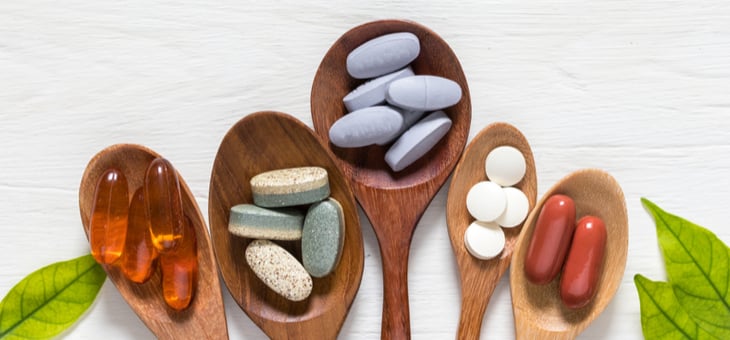With chemist shelves stocked floor to ceiling with supplements claiming outlandish health benefits, determining what you do and don’t need can be a herculean task. And just to make it all a little more confusing is the fact that different people do or don’t need certain supplements.
Multivitamins
Despite what many of us would like to believe, simply taking a multivitamin isn’t enough to counteract an unhealthy diet. In fact, health experts can’t even seem to agree on whether they’re good for you at all. Taking a mixture of vitamins may even be harmful, considering some vitamins and minerals can be damaging to the body in too high a dosage. It’s best to get your vitamins and minerals through the food in your diet, unless otherwise specified by your doctor.
The bottom line: it’s best to avoid these unless otherwise directed.
Vitamin D
Vitamin D is made by your body when you’re exposed to sunlight, and can also be found in tuna, salmon and fortified foods. It can help your immune system function, bone strength, regulates the absorption of calcium and phosphorus and can improve your resistance to certain types of disease. If you are deficient in vitamin D, there are supplements you can take to help achieve a healthy level in your body. However, some large studies have shown that vitamin D supplements offer no benefits to otherwise healthy adults, but that taking too much of the vitamin can actually be bad for your body.
The bottom line: if you’re deficient in vitamin D these supplements are helpful. However, they can be harmful if you haven’t been told by your doctor that you are deficient.
Fibre
Fibre can help to improve digestion, lower cholesterol levels, control blood sugar levels, weight maintenance and bowel health. It can be found in a wide variety of foods including fruits, nuts, legumes, wholegrains, seeds and vegetables. Only 5 per cent of people are getting the amount of fibre they need each day. It’s best to get your fibre from foods because they also contain the vitamins, minerals and nutrients your body needs. However, supplements can help you to achieve your daily recommended intake of fibre.
The bottom line: it’s best to get your fibre from your diet but, if you can’t, supplements can be helpful.
Joint supplements
Glucosamine and chondroitin and are naturally found in human cartilage and is also sold as a popular supplement. While some people say that they find relief using these supplements, recent research suggests otherwise. Some studies praise the supplements, while other suggest that they have no positive – and potentially even negative – effects. In fact, some side effects of a test on glucosamine and chondroitin included abdominal pain, diarrhoea, drowsiness, headaches, heartburn and even allergic reactions (especially for people with allergies to shellfish).
The bottom line: it’s best to avoid taking joint supplements such as glucosamine and chondroitin as research-based evidence has found them to be harmful.
Probiotics
Probiotics, or ‘good’ bacteria, can change the balance of good and bad bacteria in your body and have a range of health benefits. They can help to lower your cholesterol, support your immune system and weight loss, ease skin irritations and improve your digestion. Probiotics can be found in fermented foods such as kombucha, sauerkraut, miso and yoghurt. Research suggests that taking probiotics can help to improve the symptoms of some mental health disorders such as anxiety, depression, stress and memory loss. Some evidence suggests that taking a range of probiotics is more effective than taking a single strain. While both probiotic supplements and fermented foods are beneficial, it’s important to remember that some probiotics can be destroyed by stomach acid and will be destroyed before they reach your gut. Many of the studies that produce the most positive results required participants to consume a high dosage of between one billion and 100 billion live organisms or colony-forming units (CFU) daily.
The bottom line: probiotics can be found in food and supplements, both of which offer a range of health benefits.
Vitamin C
One of the more popular supplements on the market, vitamin C claims to help prevent or shorten the length of colds. However, there is limited research supporting this. Vitamin C is also easy to find in your diet. Just half a cup of red capsicum, or three-quarters on an orange can give you more than your recommended daily intake.
The bottom line: vitamin C is easy to find in your diet, so supplements are likely a waste of money unless otherwise directed by a doctor.
While most people are able to get the vitamins, minerals and nutrients that they need from their diet, supplements may be prescribed by doctors in the case of deficiencies or complications.
Do you take supplements? Would you take supplements without your doctor recommending them to you?
If you enjoy our content, don’t keep it to yourself. Share our free eNews with your friends and encourage them to sign up.
Related articles:
https://www.yourlifechoices.com.au/health/covid19/vitamin-link-to-virus-death-rate
https://www.yourlifechoices.com.au/health/your-health/new-vitamin-for-memory-loss
https://www.yourlifechoices.com.au/health/news/do-b-vitamins-stop-alzheimers
Disclaimer: This article contains general information about health issues and is not advice. For health advice, consult your medical practitioner.

